pep小学六年级英语下册unit3 a let's learn
2020年人教版PEP小学英语六年级下册全册课件

新版六年级(下)英语
Unit 1 H最最o新w新t人pale教lpa人版re教八yo版年u五级(1年下) 级册下册
A let’s learn
Luojiang Primary School
全全册册复精习品大课综件合
一、学习目标(Learning aims)
1.能够听、说、读、写形容词的比较形式:taller, stronger, older, younger 和 shorter.
1.My teacher is _s_t_ro_n__g_(strong).
2.My teacher is _s_t_ro_n__g_e_r(strong) than his friend.
3. Mike is __o_l_d___(old). 4. Mike is __o_l_d_e_r__(old) than Liu Ming.
He’s old.
old --- older
Who’s she? What’s she like?
Is Zhao Wei young? Who is younger?
young
younger
Xiao Yu is younger than Liu Xing.
Liu Xing is older than Xiao Yu.
Let’s chant
Tall, tall, I am tall. Short, short, you are short. Young, young, he is young. Old, old, she is old. Strong, strong, we are strong. Funny, funny, they are funny. Strict, strict, our teacher is strict.
PEP小学英语六年级下册Unit3单元整体教学设计

PEP小学英语六年级下册Unit3单元整体教学设计PEP小学英语六年级下册Unit3单元整体教学设计一、教学目标知识与技能:1.掌握表示颜色的单词。
2.学习表达“穿”衣服的动词。
3.了解并掌握一些常见的穿衣搭配。
情感态度与价值观:1.培养学生的团队合作意识。
2.让学生学会感恩生活,并感受到彼此之间的爱与关爱。
二、教学重点掌握表示颜色的单词,学习表达“穿”衣服的动词。
三、教学难点了解并掌握一些常见的穿衣搭配。
四、教学内容1. 核心词汇:yellow, green, blue, black, white, yellow pants, blue shirt, green cap, black shoes, white socks, wear, clothes。
2. 重点句式:I’m wearing a green cap and black shoes.She is wearing a blue shirt and yellow pants.What color is your cap?What are you wearing today?五、教学方法采用任务式教学法,学生在团队合作的情境中完成任务,让学生在情景中理解单词和句型的含义并能够流利使用。
同时采用游戏、歌曲、口语交际等多种教学方式,丰富教学内容,提高课堂趣味性。
六、教学流程Step 1:Warm-up开场播放Let's learn一课关于颜色的学习flash,学生跟读,复习颜色词汇。
Step 2:Presentation and practice1. Presentation(1)Teacher wears different clothes and ask students to make sentences in the form of "I'm wearing...". For example, teacher wears a red hat and green shoes, then teacher says "I'm wearing a red hat and green shoes", then ask students to repeat. And helps students to learn the phrase “I’m wearing...”。
PEP六年级英语下册 Unit 3 Part A Let's learn.说课稿
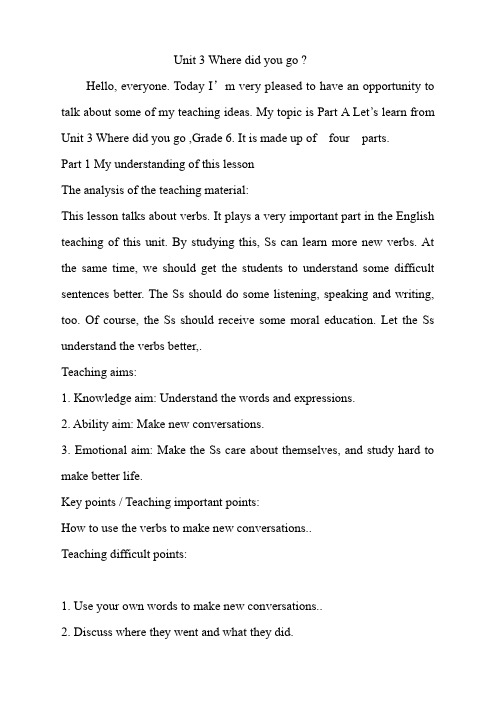
Unit 3 Where did you go ?Hello, everyone. Today I’m very pleased to have an opportunity to talk about some of my teaching ideas. My topic is Part A Let’s learn from Unit 3 Where did you go ,Grade 6. It is made up of four parts.Part 1 My understanding of this lessonThe analysis of the teaching material:This lesson talks about verbs. It plays a very important part in the English teaching of this unit. By studying this, Ss can learn more new verbs. At the same time, we should get the students to understand some difficult sentences better. The Ss should do some listening, speaking and writing, too. Of course, the Ss should receive some moral education. Let the Ss understand the verbs better,.Teaching aims:1. Knowledge aim: Understand the words and expressions.2. Ability aim: Make new conversations.3. Emotional aim: Make the Ss care about themselves, and study hard to make better life.Key points / Teaching important points:How to use the verbs to make new conversations..Teaching difficult points:1. Use your own words to make new conversations..2. Discuss where they went and what they did.Something about the Ss:1.The Ss have known something about what sb did in the past.2. They don’t often use English to express themselves and communicate with others.3. Some Ss are not active in the class because they are afraid of making mistakes.Part 2 My teaching theories, methods and aidsBefore dealing with this lesson, I’ll do my best to carry out the following theories: Make the Ss the real masters in class while the teacher himself acts as director;Combine the language structures with the language functions; Let the students receive some moral education while they are learning the English language.Teaching method:Double activities teaching methodQuestion-and-answer activity teaching methodWatch-and-listen activityFree discussion methodTeaching aids:1.some cards2.some objects3. a tape recorder4. the blackboardPart 3. Teaching steps / proceduresI have designed the following steps to train their ability of listening, speaking, reading and writing.The entire steps are:Greetings, Revision, Lead-in and reading, Preparation for details of the lesson, Consolidation, Discussion, Homework.Step 1 GreetingsGreet the whole class as usual.Step 2. Revision1. T: Act,let the Ss guess.2.Ask students some questions to revise the last lesson(show them on the screen).a. What did you do last Saturday?b. What did he do last Sunday?c. What did he do yesterday?d.What did you do last Monday?Step 3. Lead-in and preparationShow them some pictures and let them talk each other, and then use the pictures about places and the things we or they did in the past . Purpose: Arouse the students’interest of study.Bring in new subject: Where we or they went and what we or they did there.Method: Talk about the pictures , read the words and expressions and act. Purpose: Help the Ss remember the words and expressions best.Step 5. Play a game.Look, act and guess.Purpose: Make the Ss learn the expressions best and feel interesting. Step 6. ConsolidationRead the words and expressions , finish the conversation. Purpose: Let the Ss can communicate better.Step 7. DiscussionShow them some words and expressions, let the Ss talk freely. Purpose: Give the Ss much ,they can give us more.Step 8. Listening and exercise.Purpose:Improve the Ss listening and writing ability .Step 9. SummaryLet the Ss make a summary.Purpose:Let the Ss remember the lesson better.Step 10. HomeworkRead the words and expressions and make new conversations.Part 4. Blackboard designUnit 3 Where did you go?A: Where did you go_____? go went camping / fishing B: I went to ____________. ride rode a horseA:What did you do there? rode a bikeB: I ___________________. hurt hurt my footThat’s all , Thank you for listening!。
PEP小学英语六年级下册第三单元教案
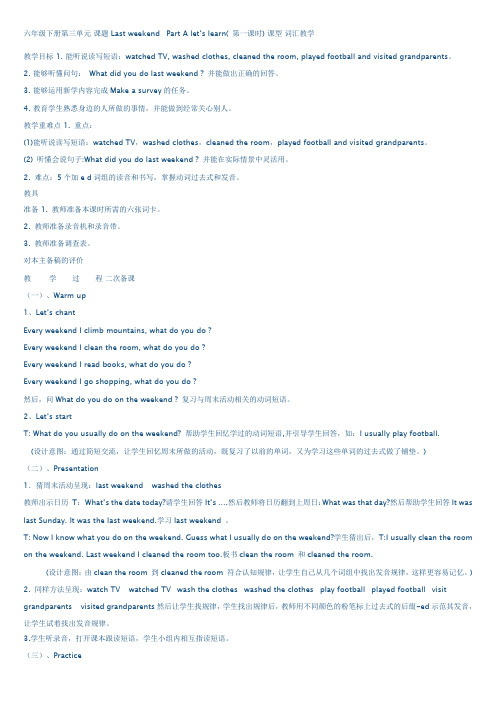
六年级下册第三单元课题 Last weekend Part A let’s learn( 第一课时) 课型词汇教学教学目标 1. 能听说读写短语:watched TV, washed clothes, cleaned the room, played football and visited grandparents。
2. 能够听懂问句:What did you do last weekend ? 并能做出正确的回答。
3. 能够运用新学内容完成Make a survey的任务。
4. 教育学生熟悉身边的人所做的事情,并能做到经常关心别人。
教学重难点 1. 重点:(1)能听说读写短语:watched TV,washed clothes,cleaned the room,played football and visited grandparents。
(2) 听懂会说句子:What did you do last weekend ? 并能在实际情景中灵活用。
2. 难点:5个加e d词组的读音和书写,掌握动词过去式和发音。
教具准备 1. 教师准备本课时所需的六张词卡。
2. 教师准备录音机和录音带。
3. 教师准备调查表。
对本主备稿的评价教学过程二次备课(一)、Warm up1、Let’s chantEvery weekend I climb mountains, what do you do ?Every weekend I clean the room, what do you do ?Every weekend I read books, what do you do ?Every weekend I go shopping, what do you do ?然后,问What do you do on the weekend ? 复习与周末活动相关的动词短语。
2、Let’s startT: What do you usually do on the weekend? 帮助学生回忆学过的动词短语,并引导学生回答,如:I usually play football.(设计意图:通过简短交流,让学生回忆周末所做的活动,既复习了以前的单词,又为学习这些单词的过去式做了铺垫。
Unit3WheredidyougoPartALet'sLearn(教学设计)人教PEP版英语六年级

人教版《英语》(三年级起点)六年级下册Unit 3 Where did you go?A Let’s learn词汇课教学设计一、教学目标1.语言能力目标(1)能够听、说、读、写短语:rode a horse, rode a bike, went camping, went fishing, hurt my foot并能区分其原形及过去式。
(2)能听、说、认读句子: Where did you go last Saturday? I went to a forest park. What did you do there? I rode a bike. 并在情境中理解与正确运用。
(3)掌握核心句型:Where did you go …?和What did you do?的语义以及语用情景,并能根据内容进行第三人称的转换。
2.学习能力目标通过单词拼读规则,学习新知,通过篇章培养学生自主学习能力。
能让孩子们在情境中理解并在真实场景中正确运用过去式。
3.思维品质目标通过关键词holiday,回想更多的节日,通过动词短语去回想更多的相关词组,培养学生的思维发散能力。
4.文化意识目标能够通过主题了解更多的节日及相关知识,培养学生的文化素养,倡导积极向上的生活态度。
二、教学重点1. 5个动词短语的过去式;2. 掌握核心句型:Where did you go …?和What did you do?的语义以及语用情景。
三、教学难点能够在情景中恰当运用由where和what引导的一般过去时特殊疑问句。
四、教学思路本课是对第二单元话题Last Weekend知识语言的深度拓展,从语言能力上运用过去式进行更广泛深入的表达。
本堂课始终围绕主线holiday开始各种活动,课堂伊始,通过歌曲引出主题holiday,进行有关于holiday去了哪里,做了什么,假日怎么样等拓展问答后,带入新知,通过听说、观察图片等方式,导入新词;通过发散,带出更多的相关短语;利用课文的听写练习复习了动词短语;最后小组合作活动让孩子们通过讨论的方式表达自己的假日活动,在真实的交流中逐步达成应用本课语言的目标。
Unit 3 Where did you go?Part A教案设计-人教版(三起)英语六年级下册
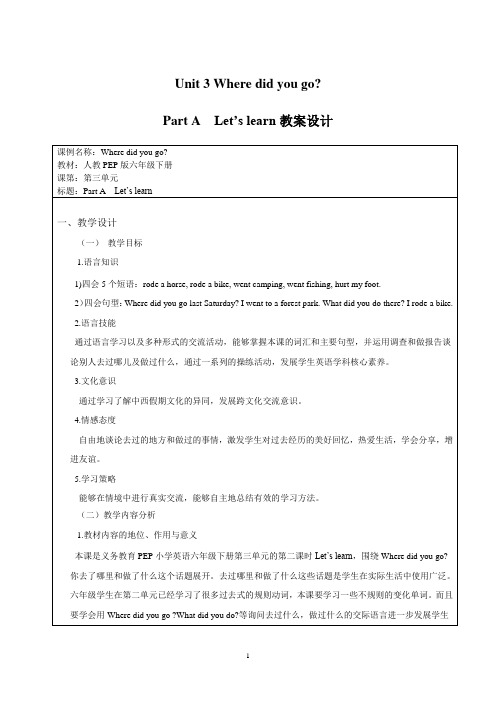
活动设计意图:通过观看视频和图片能充分调动学生的整体感观,提高参与度,并且游戏教学能够寓教于乐,激发了学生的学习兴趣,让他们对此记忆深刻,在学习知识的同时形成了积极的学习态度,又很好地巩固所学知识。
4)听录音朗读单词和句型
5)复述约翰的周六故事
请几位学生扮演约翰的一家人演周六的活动
Step3. Consolidation
1) Make a survey
提示:要求用句型Where did you go last summer/winter holiday?和What did you do ?来提问班上的同学。
Name
Where?
What?
Wu Yifan
媒介运用:PPT、调查表
媒介运用:图片、PPT、视频
活动设计意图:通过教师的暑假活动带出John的周六假期活动,观看视频引出约翰去了一个森林公园。并通过图片训练Where did you go ? I went to ….句型。视频的设置目的是把五个新单词串成一个简短的故事,情境中教学单词,以便学生记忆单词。
Step2. Presentation and practice
to Zhaoqing . He ate good
food…
4.Summing
Summing up
1. Words:
rode a horse, rode a bike, went camping, went fishing, hurt my foot.
2.Sentences:
Where did you go last Saturday? I went to a forest park. What did you do there? I rode a bike.
PEP小学六年级英语下册第三单元同步练习题

六年级(下)第3单元第1课时当堂达标题Unit 3 Where did you go?A Let ’ s talkⅠ.选择填空。
1. B 【解析:问题中的特殊疑问词是What,是指做什么事情,因此选B saw a film.】2. B 【解析:答语是去了上海,上海是地点,针对地点的特殊疑问词是Where,因此选B. Where.】3. C【解析:问题中的人称是he, 所以选Yes,he did.】4. A【解析:一般过去时的一般疑问句的句首是did, did帮助构成一般疑问句,后面的动词要用原形,所以选A. watch】5. A【解析:句中有助动词did,说明句子是一般过去时,因此要选表示过去的时间:last weekend.】II . 连词成句。
(注意大小写和标点符号)1. I fell off my bike last Saturday.2. We saw lots of grapes there.3. Look at my photos from the Labour Day holiday.4. What did you do there?5. He went to Mt. Tianshan, Xinjiang.III . 把下列句子翻译成英语。
1. Where did you go?2. I rode a horse.3. They won ’ t be ready till August.4. Are you all right?六年级(下)第3单元第2课时当堂达标题Unit 3 Where did you go?A Let ’ s learnⅠ.Look and choose.(图文配对。
)A. rode a bikeB. rode a horseC. went fishingD. went campingB. E. hurt my foot( ) ( )( ) ( ) ( )II. Read and write . (读一读,按要求写一写。
小学六年级英语第三单元
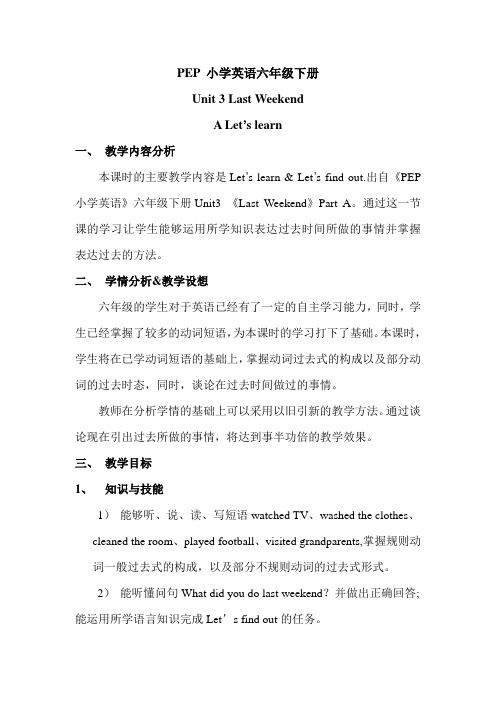
PEP 小学英语六年级下册Unit 3 Last WeekendA Let’s learn一、教学内容分析本课时的主要教学内容是Let’s learn & Let’s find out.出自《PEP 小学英语》六年级下册Unit3 《Last Weekend》Part A。
通过这一节课的学习让学生能够运用所学知识表达过去时间所做的事情并掌握表达过去的方法。
二、学情分析&教学设想六年级的学生对于英语已经有了一定的自主学习能力,同时,学生已经掌握了较多的动词短语,为本课时的学习打下了基础。
本课时,学生将在已学动词短语的基础上,掌握动词过去式的构成以及部分动词的过去时态,同时,谈论在过去时间做过的事情。
教师在分析学情的基础上可以采用以旧引新的教学方法。
通过谈论现在引出过去所做的事情,将达到事半功倍的教学效果。
三、教学目标1、知识与技能1)能够听、说、读、写短语watched TV、washed the clothes、cleaned the room、played football、visited grandparents,掌握规则动词一般过去式的构成,以及部分不规则动词的过去式形式。
2)能听懂问句What did you do last weekend?并做出正确回答; 能运用所学语言知识完成Let’s find out的任务。
2、过程与方法•通过以旧引新、创设情景帮助学生理解文本信息。
•通过多媒体创设真实情境,培养他们的听说交际能力。
•通过拓展性练习活动,培养学生语言运用的能力。
•通过小组活动,培养学生小组合作意识。
3、情感态度与价值观培养学生养成良好的生活、学习习惯。
学会用英语叙述自己做过的事情。
四、教学重难点1)重点:听说读写短语watched TV、washed the clothes、cleaned the room、played football、visited grandparents;能听说句子What did you do last weekend?并能就过去时间所做的事情进行简单回答.2)难点:学生对本课的几个短语都比较熟悉,但动词的过去式第一次出现,因此,这几个短语的动词过去式的构成及其发音是本课时的难点。
2020春人教PEP版六年级英语下册教案-Unit 3 第三课时
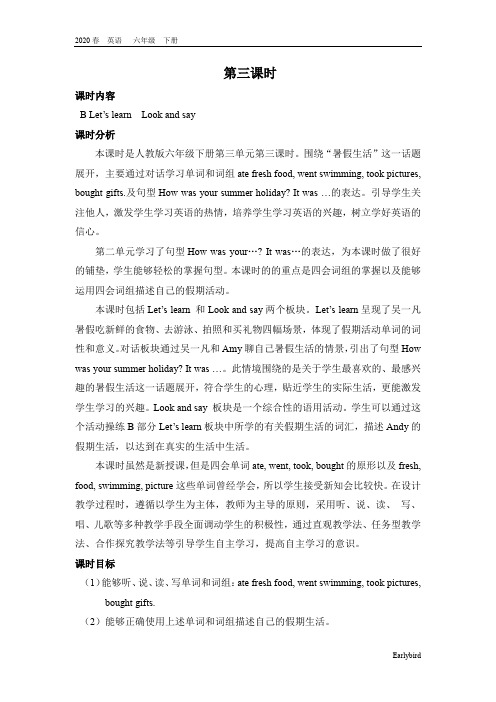
第三课时课时内容B Let’s learn Look and say课时分析本课时是人教版六年级下册第三单元第三课时。
围绕“暑假生活”这一话题展开,主要通过对话学习单词和词组ate fresh food, went swimming, took pictures, bought gifts.及句型How was your summer holiday? It was …的表达。
引导学生关注他人,激发学生学习英语的热情,培养学生学习英语的兴趣,树立学好英语的信心。
第二单元学习了句型How was your…? It was…的表达,为本课时做了很好的铺垫,学生能够轻松的掌握句型。
本课时的的重点是四会词组的掌握以及能够运用四会词组描述自己的假期活动。
本课时包括Let’s learn 和Look and say两个板块。
Let’s learn呈现了吴一凡暑假吃新鲜的食物、去游泳、拍照和买礼物四幅场景,体现了假期活动单词的词性和意义。
对话板块通过吴一凡和Amy聊自己暑假生活的情景,引出了句型How was your summer holiday? It was …。
此情境围绕的是关于学生最喜欢的、最感兴趣的暑假生活这一话题展开,符合学生的心理,贴近学生的实际生活,更能激发学生学习的兴趣。
Look and say 板块是一个综合性的语用活动。
学生可以通过这个活动操练B部分Let’s learn板块中所学的有关假期生活的词汇,描述Andy的假期生活,以达到在真实的生活中生活。
本课时虽然是新授课,但是四会单词ate, went, took, bought的原形以及fresh, food, swimming, picture这些单词曾经学会,所以学生接受新知会比较快。
在设计教学过程时,遵循以学生为主体,教师为主导的原则,采用听、说、读、写、唱、儿歌等多种教学手段全面调动学生的积极性,通过直观教学法、任务型教学法、合作探究教学法等引导学生自主学习,提高自主学习的意识。
六年级下册Unit 3 A Let's learn 说课稿
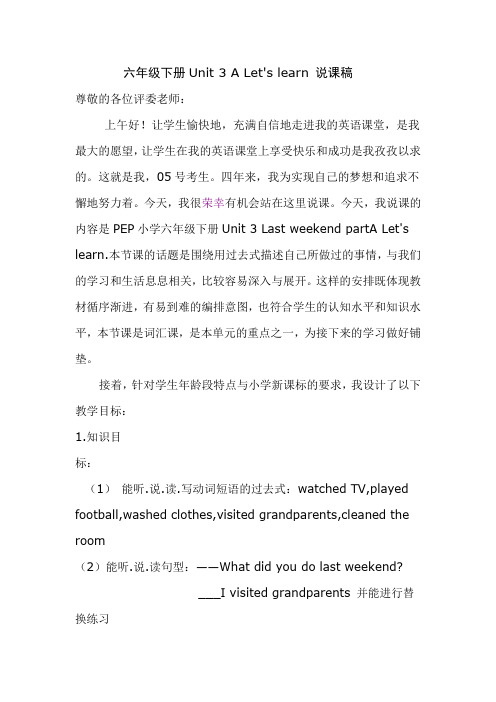
六年级下册Unit 3 A Let's learn 说课稿尊敬的各位评委老师:上午好!让学生愉快地,充满自信地走进我的英语课堂,是我最大的愿望,让学生在我的英语课堂上享受快乐和成功是我孜孜以求的。
这就是我,05号考生。
四年来,我为实现自己的梦想和追求不懈地努力着。
今天,我很荣幸有机会站在这里说课。
今天,我说课的内容是PEP小学六年级下册Unit 3 Last weekend partA Let's learn.本节课的话题是围绕用过去式描述自己所做过的事情,与我们的学习和生活息息相关,比较容易深入与展开。
这样的安排既体现教材循序渐进,有易到难的编排意图,也符合学生的认知水平和知识水平,本节课是词汇课,是本单元的重点之一,为接下来的学习做好铺垫。
接着,针对学生年龄段特点与小学新课标的要求,我设计了以下教学目标:1.知识目标:(1)能听.说.读.写动词短语的过去式:watched TV,played football,washed clothes,visited grandparents,cleaned the room(2)能听.说.读句型:——What did you do last weekend?___I visited grandparents 并能进行替换练习2.能力目标掌握五个动词短语的过去式以及在实际情景中的运用并了解一般过去式的变化规律及发音规则3.情感目标培养学生合理安排生活的能力,适时强化尊老爱幼的教育接下来说下教学重难点教学重点:掌握Let's learn 中动词短语的过去式以及在句子中进行问答教学难点:动词过去式的发音规则及变化规律接下来说学情六年级的学生已经学习了三年的英语,这一学年又是小学阶段的最后一年,大部分学生好奇,好动,善模仿,好表演,该阶段的学生可塑性强,对新鲜事物充满极大的兴趣,并具有能用简单的英语互相问候,根据所学内容进行表演小对话或歌谣的能力,在学习过程中乐于参与,积极合作,主动请教。
英语人教版六年级下册【观评记录】U3ALearn_英语_小学_曹花
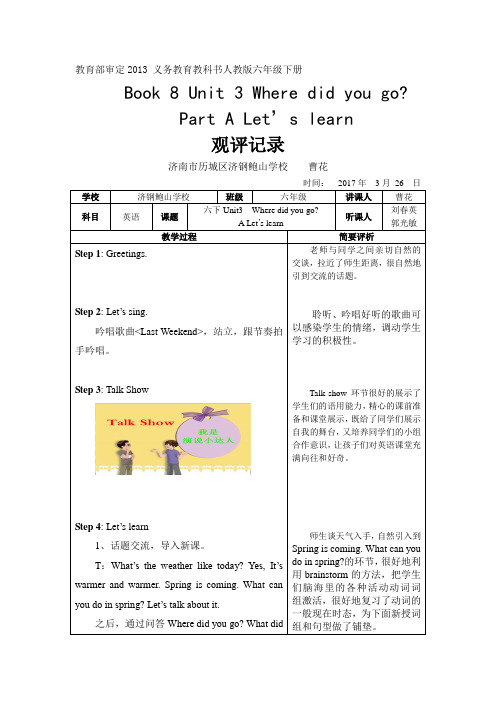
Step 7: summary
对本节课的语言知识点 总结回顾,很好的疏通知识 点,让学生们做到心中有数, 同时也为后面一个环节的运 用打基础。
Interview 环节,在四人一 Step 8: Group Work 2 小组内进行,这是语用的实 现。通过运用 Where、What、 When 引导的特殊疑问句,调 查了解同学的周末或假期活
2、通过猜测、听音、集体问答等多种方式
对所学词组巩固练习。
通过听录音纠正学生的发音,
3、跟读 let’s learn 部分录音,并按照老师口 培养学生良好的语音语调, 初步形 令重新排列五幅图画。
成一定的语感语速。
重新排列五幅图画环节,是对 学生认读词组的测试,该方式 机动灵活,用时短作用大。
Step 5: Practice 活动和游戏都是围绕与 学生自身息息相关的事展开, 充分地调动了学生的积极性。
动安排,提倡健康运动。 小组展示培养了合作意 识。最后自然生成语篇,达到 学以致用的目的。 接下来 通过浏览祖国大 好河山,既培养学生的爱国情 怀,又引导孩子们多走出去, 走向大自然,学会与他人分享 快乐。 Step 9 :Homework. 自主选择拓展作业,根据 自己掌握情况进行 3 选一的星 级练习题,使每个同学都能体 会到收获知识的快乐,达到课 后复习巩固及实际运用目的。
The Cat Fishing 游戏里的训练 题型样式多样。 孩子们喜欢游
戏,爱玩游戏,哪怕是即将小 学毕业的六年级学生也是如 此,爱玩是孩子们的天性。所 以该教师把枯燥无味的巩固 训练放到游戏中,很大的调动 了孩子们参与的积极性。对小 鱼背后的好奇,对自我表现的 欲望,对小组得高分的期待等 等,孩子们边玩边练,小组合 作,自我展示,整个课堂充满 了竞赛的紧张气氛。知识巩固 练习由词组上升到句子,再上 升到语篇,学生们挑战了自 我,拓展了语言知识。
新版PEP小学六年级英语下册Unit-3-Where-did-you-go教案
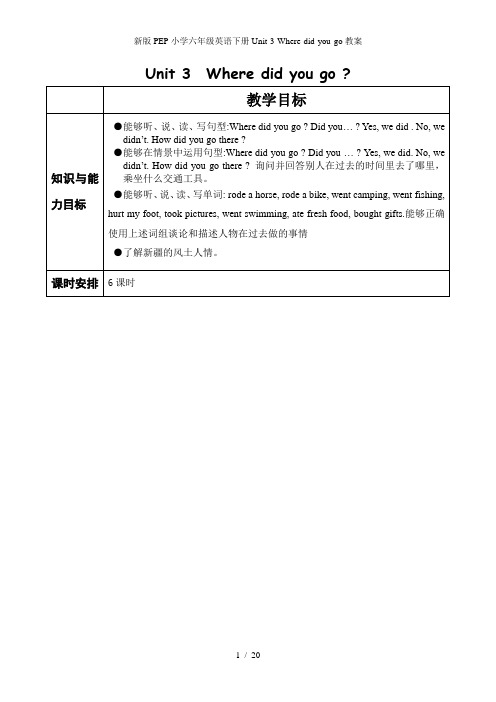
Unit 3 Where did you go ?第一课时教学步骤:Step 1. Warm-up1.利用图片和学生一起唱歌谣,要求一边唱一边做动作。
如:What can you do ? I can sing.What can you do ? I can dance.What can you do ? I can climb a mountain.What can you do ? I can take a pictures.What can you do ? I can speak Chinese.2.用多媒体课件展示自己外出旅游的照片,并做相关介绍。
如:Last summer holiday, I went to hainan. It was sobeautiful. I went swimming in the sea. And picked someseashells on the beach.Step 2. PresentationLet’s talk(从呈现完整对话到处理局部语言)1.整体感知对话并回答问题。
(1)通过提问要求学生猜测:Did yougo to John’s home ? What happened toJohn? What did they talk about later?请学生带着问题观看动画或阅读文本,了解John脚受伤的原因:He fell of hisbike,利用图片帮助学生理解并教授fell.同时,通过观看动画或阅读文本获得对话的主旨:They talked about John’sLabout Day holiday.(2)结合日历,让学生理解Labour Day holiday概念。
提问:Look at the calendar.What date is it ? It’s May 1st . On May 1st ,we usually have three days off. We call it Labour Day holiday.(3)继续提问学生:Where did John go on his Labour Day holiday ? What did hedo there ? 要求学生带着问题观看动画或阅读文本获取信息,并用思维导图板书对话关键信息。
六年级下册英语教案 Unit 3 Where did you go?∣ 人教版(PEP)
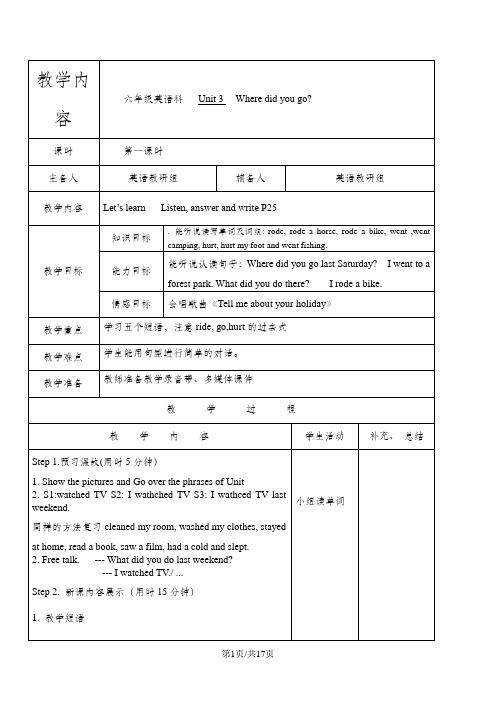
1.他上周六去钓鱼。A. I hurt my foot last Tuesday.
2.我妈妈上周末去野营。B. She rode a bike last Monday.
3.约翰昨天去骑马。C. He went finshing last Saturday.
4.她上周一骑自行车。D. My mum went camping last weekened.
5.我上周二伤了脚。E. John rode a horse yesterday.
三.写出下列动词的过去式。
go--ride--hurt --
watch--clean--。
Step5、布置当堂作业(用时1分钟)
1.抄写并背诵四会短语2.用本课时句型写一个对话。
板书设计:
Unit 3 Where did you go?
1.齐读P25,师生互译重点短语和句子。
2. Translate the fllowing sentences.
What happend? Are you all right? I’m OK now.
It looks like a mule. Did you go to Turpan? Yes, we did.
教学准备
教师准备教学录音带、多媒体课件
教学过程
教学内容
学生活动
补充、总结
Step 1.预习温故(用时5分钟)
1.复习Let’s learn.Eg: rode a horse. I rode a horse last weekend.
2. Free talk. --Where did you go last Sunday/ Saturday? -- I went to a forest park.
人教版小学英语PEP教材六年级下册第三单元《Unit 3 Where did you go?》A Let’s learn 教案
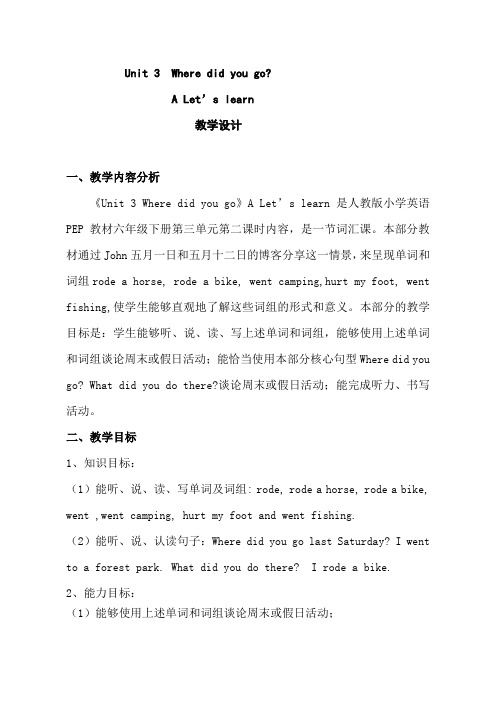
Unit 3 Where did you go?A Let’s learn教学设计一、教学内容分析《Unit 3 Where did you go》A Let’s learn是人教版小学英语PEP教材六年级下册第三单元第二课时内容,是一节词汇课。
本部分教材通过John五月一日和五月十二日的博客分享这一情景,来呈现单词和词组rode a horse, rode a bike, went camping,hurt my foot, went fishing,使学生能够直观地了解这些词组的形式和意义。
本部分的教学目标是:学生能够听、说、读、写上述单词和词组,能够使用上述单词和词组谈论周末或假日活动;能恰当使用本部分核心句型Where did you go? What did you do there?谈论周末或假日活动;能完成听力、书写活动。
二、教学目标1、知识目标:(1)能听、说、读、写单词及词组: rode, rode a horse, rode a bike, went ,went camping, hurt my foot and went fishing.(2)能听、说、认读句子:Where did you go last Saturday? I went to a forest park. What did you do there? I rode a bike.2、能力目标:(1)能够使用上述单词和词组谈论周末或假日活动;(2)能够使用核心句型:Where did you go ...? What did you do? 谈论周末或假日活动。
(3)能完成听力、书写活动。
3、情感目标:培养学生合理安排学习和生活的能力,激发学生热爱大自然的美好情感。
4、学习策略:通过小组合作的学习方式培养和提高学生的合作意识,提高学生的学习能力。
5、文化意识:激发学生热爱大自然的美好情感并进行外出游玩的安全教育。
- 1、下载文档前请自行甄别文档内容的完整性,平台不提供额外的编辑、内容补充、找答案等附加服务。
- 2、"仅部分预览"的文档,不可在线预览部分如存在完整性等问题,可反馈申请退款(可完整预览的文档不适用该条件!)。
- 3、如文档侵犯您的权益,请联系客服反馈,我们会尽快为您处理(人工客服工作时间:9:00-18:30)。
Game(游戏): Listen to the music and pass the box. 要求: 音乐停止时,手持盒子的同学从盒子 中抽出一张纸,如果抽出的纸条写着 lucky,将会获得小礼物一份;如果抽出 的纸条是写有动词短语的,则需根据纸上 的动词短语造句“I rode a bike last weekend .(主语+过去式动词短语+过去 时间)
当你出游时,请做一个文明的游客!
1、写一篇以《 Last holiday 》为题的 小作文。 2、抄写本课所学的单词组,每个三行。
I went swimming in the sea, in the sea, in the sea. I went shopping near the sea. I bought a gift for you.
I rode a bike in the park, in the park, in the park. I didn’t see a big round stone. And ouch, I hurt my foot.
I am
go camping
大小声
go fishing
男女
What did he do there?
He went fishing .
What did she do there?
She rode a horse.
no
ride a horse
分组
What did she do there?
She rode a bike.
went camping yesterday
hurt his foot
got a new bike and rode it for the whole day.
went fishing rode horses
Interview(采访):
What did you do last weekend? Name Amy Activities went fishing
ride a bike
What did she do there ?
She fell off the bike and hurt her foot. nurse 过去式hurt
He / She hurt _____ foot .
Sharp eyes
Last weekend, I…
went camping hurt his foot went fishing
Where did you go?
Where did you go on your holiday, holiday, holiday ? Did you swim ? Did you shop? What did you do? Where did you go on your holiday, holiday, holiday ? Did you run ? Did you jump ? What did you do?
Where did you go last Saturday?
I went to …
Do you want to know what did I do ?
Last Saturday, I
went camping
went fishing
rode a horse
rode a bike
hurt my foot
…
… … Report : Hello, I am …. My friend Amy is a good girl. She washed the clothes last weekend. …
We had a colorful weekend.
庐山 黄山
三亚 天山
When you travel, please to be a Civilized Tourist!
1. go camping I am
went camping
(go的过去式)
2.go fishing
3.ride a horse
↘
went fishing rode a horse
like
4.ride a bike
no rode a bike nurse 5.hurt his foot
Hale Waihona Puke ↘What did they do there? They went camping .
Pick up stars
clean my room
I usually
cook the meals go hiking
… What do you usually do on the weekend ?
I usually / often / sometimes …
I went to a forest park last Saturday.
